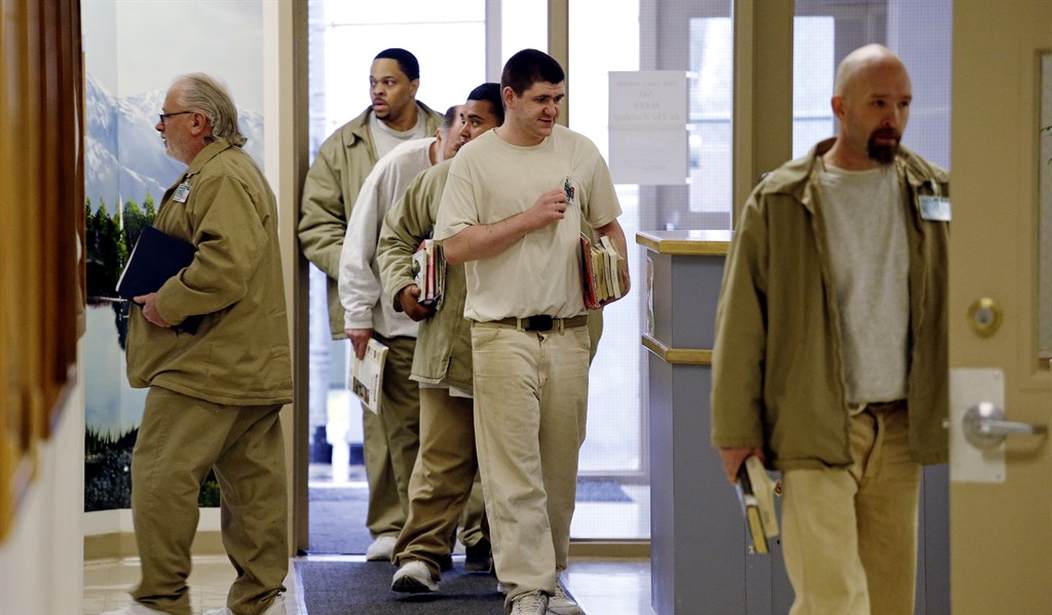While the news cycle has been dominated by 2016 election politics, especially the antics of Donald Trump, there’s a critical battle on the Hill that seeks to create a fairer criminal justice system, which currently bleeds taxpayers $80 billion a year. Recently, the Sentencing Reform and Corrections Act of 2015 has been subject to discussion among lawmakers, which garnered support from four additional Republican senators–Thad Cochran (R-MS), Steve Daines (R-MT), Mark Kirk (R-IL), and Dan Sullivan (R-AK)–last week.
Holly Harris, executive director of the U.S. Justice Action Network, commented on this development, saying:
American taxpayers are spending too much money locking up too many people for far too long – and we aren’t getting the public safety return we deserve. On behalf of our eight partner organizations representing conservative and progressive views, we applaud Chairman Chuck Grassley and Ranking Member Patrick Leahy and the bipartisan group of Senators who have worked so hard on legislation that safely reduces the federal prison population and makes our justice system fairer and more effective. We urge the full Senate to bring this legislation to a vote.”
Even veterans groups are starting to get behind the effort. On April 14, Dan Caldwell, Vice President for Political & Legislative Action with Concerned Veterans for America met with Sen. John Thune (R-SD), Sen. John McCain (R-AZ), Sen. John Cornyn (R-TX), Sen. Pat Toomey (R-PA), and Sen. John Boozman (R-MO). Caldwell also a drafted a letter to Senate Majority Leader Mitch McConnell (R-KY) and Sen. Harry Reid (D-NV), urging the chamber to move “swiftly” on this bill, especially since the bill includes a provision that would assist veterans released from federal prison.

There has been resistance to this effort from the left and right. During the American Conservative Union’s Conservative Political Action Conference in March, Milwaukee County Sheriff David Clarke, a Democrat, viewed this as a “Trojan horse” effort that will do nothing but shift costs from the federal level to the state and local municipalities. He also said that there is no such thing as a nonviolent drug offender, and added that statistics don’t mean much to the parent who’s trying to do everything they can to keep their kid safe and alive, while the drug dealer is on the street corner every day. Taking that element off the street is a big deal to those people. That’s a fair point. Things are viewed differently at the street level, but let’s not disregard facts and statistics. You simply can’t in any serious conversation on policy.
Recommended
At the conference, Townhall ran into Derek Cohen, Deputy Director for the Texas-based Right On Crime, and Joe Luppino-Esposito, a policy analyst with the organization, where they noted that a lot of the rhetoric against criminal justice reform deals with some folks “unable to see the forest for the trees.” Esposito added that there is an argument that taking the low-level drug dealer off the streets might create an aura of safety, but the replacement for that dealer will be on the streets before he (or she) could be processed by authorities. It’s an expensive whack-a-mole game that doesn’t tackle who is really the source of the problem regarding drug trafficking: the kingpins.
Cohen also mentioned that back in the 1980s, we had a spike in violent crime, drug use, and trafficking, though criminology and policy discussions relating to the subject was in its infancy. There were no abstract concepts. Looking back, everyone agrees that the various tough on crime measures did reduce crime by 20 percent—but the question is what accounts for the remaining 80 percent.
Esposito said that it’s here where Clarke’s “we don’t need to be smart on crime, we want to be serious on crime” starts to look like nothing but a good slogan because it’s hard to take someone seriously when you shut yourself off from the facts, and the facts are there. He added that it would make a lot for sense to look at the 40 states that have initiated criminal justice reforms that Right on Crime has advocated to do something serious about crime, incarceration, and the costs associated with both.
Jason Pye, an ally in the criminal justice reform fight and communications director for FreedomWorks, said at the time:
Speaking for FreedomWorks I appreciate David Clarke’s service; I’m sure he means well, but what we know is that the policies of the last three decades have increased the number of prisoners, what we call mass incarceration. We have 2 million people in prison across the country that stay in federal and local jails…we know it costs $80 billion a year. What we’ve seen at state levels, states like Texas and Georgia, they implemented sentencing reforms and corrections reforms that reduced the cost.
Pye added that Texas saved $3 billion over roughly a ten-year period. Georgia started in 2011, and they saved $265 million. These are real savings that could be invested elsewhere. Recidivism rates have dropped–nine points in Texas alone–due to work training, education, and giving them the ability to be productive citizens.
Concerning Clarke’s remarks about statistics not mattering to parents at the street level, Pye said that people in that camp are just making emotional appeals. The argument is that we want our communities to be safe, but what we have seen in Texas (after their 2007 reforms) are crime rates dropping to their lowest levels since 1968.
He also mentioned cases, like Weldon Angelos, who is serving a 55-year jail sentence without the possibility of parole for dealing $1,000 worth of marijuana in three separate police stings, while also possessing a firearm. Yes, Angelos broke the law and deserved to go to prison, but as a first-time offender, did he deserve what’s pretty much a death sentence? When he is released, he’ll be around 80 years old. Even the judge who sentenced him feels the punishment is outrageous (via ABC News):
As a result, Angelos may not live long enough to experience freedom again. His case has haunted the federal judge that put him there."I do think about Angelos,” said Paul Cassell, a now-retired federal judge in the Utah circuit. “I sometimes drive near the prison where he’s held, and I think, ‘Gosh he shouldn’t be there. Certainly not as long as I had to send him there. ... That wasn’t the right thing to do. The system forced me to do it.”
[…]
Paul Cassell, who was appointed by President George W. Bush, now teaches law at the University of Utah. But he says the Angelos case still weighs on him, which is the reason he agreed to speak to “Nightline” about his ruling, something federal judges rarely do.
When Cassell delivered his ruling in the Angelos case, he was quick to point out how severe the sentence seemed compared to other, violent crimes.
“If he had been an aircraft hijacker, he would have gotten 24 years in prison. If he’s been a terrorist, he would have gotten 20 years in prison. If he was a child rapist, he would have gotten 11 years in prison. And now I’m supposed to give him a 55-year sentence? I mean, that’s just not right,”
And circling back to the costs, the taxpayers are set to eat a $1.5 million bill for keeping Angelos a guest of the government.
Sen. Tom Cotton (R-AR) signaled at the beginning of this year that he will lead the charge against criminal justice reform on Capitol Hill, with Pye commenting that maybe he should consult with his own governor, Asa Hutchinson, who backs such overhauls in our system. He also said that one only has look at Mississippi, Texas, Georgia, Alabama, and South Carolina - all Republican states that have initiated criminal justice reforms, to see that they’ve reaped public safety dividends.
Keep in mind, no one is advocating that people convicted of drug offenses should be set free or get no jail time, but when the length of prison time for a first-time drug offender exceeds that of a terrorist or a child rapist, there’s something inherently unfair and unjust about that sentence. Moreover, it’s a waste of the taxpayers’ money.

























Join the conversation as a VIP Member